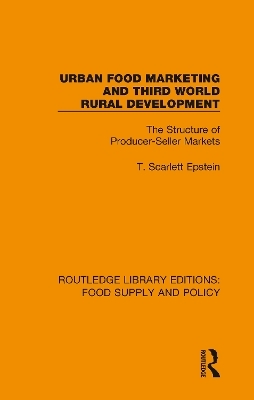
Urban Food Marketing and Third World Rural Development
The Structure of Producer-Seller Markets
Seiten
2021
Routledge (Verlag)
978-0-367-27591-4 (ISBN)
Routledge (Verlag)
978-0-367-27591-4 (ISBN)
Originally published in 1982. This book explores the nature of food marketing in Third World countries. It examines the phenomenon of producer-seller markets, basing the study on the situation in New Guinea and uses this data to construct theoretical propositions for the marketing of various food items.
Originally published in 1982. This book explores the nature of food marketing in Third World countries. Economic development invariably involves a transition from the traditional subsistence and/or barter economics to increasing participation in cash transactions. In many less developed countries this transition has been facilitated by enterprising middlemen, who provide the link between dispersed small satellite producers and urban buyers. In spite of these developments, producer-seller markets still operate in numerous countries, particularly the newly independent Pacific island states and large parts of Africa and Asia.
This book examines the phenomenon of producer-seller markets, basing the study on the situation in New Guinea. The author then uses this data to construct theoretical propositions for the marketing of various food items and examines the producer-seller market, arguing that the lack of inter-regional economic interdependence is likely to promote secessional movements, particularly in states where two or more ethnic groups exist.
Originally published in 1982. This book explores the nature of food marketing in Third World countries. Economic development invariably involves a transition from the traditional subsistence and/or barter economics to increasing participation in cash transactions. In many less developed countries this transition has been facilitated by enterprising middlemen, who provide the link between dispersed small satellite producers and urban buyers. In spite of these developments, producer-seller markets still operate in numerous countries, particularly the newly independent Pacific island states and large parts of Africa and Asia.
This book examines the phenomenon of producer-seller markets, basing the study on the situation in New Guinea. The author then uses this data to construct theoretical propositions for the marketing of various food items and examines the producer-seller market, arguing that the lack of inter-regional economic interdependence is likely to promote secessional movements, particularly in states where two or more ethnic groups exist.
Trude Scarlett Epstein OBE was a social anthropologist and economist, whose work in development studies focused in particular on rural economies.
Part 1: Introduction 1. The Web of Producer-seller Markets 2. Market Settings Part 2: Market Transactions 3. Demand 4. Supply Part 3: Theoretical And Practical Implications 5. Price Formation Process 6. Food Marketing in a Developing Economy 7. Small Farmers, Increasing Food Supplies and Novel Market Structures. Appendix A. The Craft of Market Studies. Appendix B. Sellers and Buyers Schedules. Appendix C. Guidelines for Sellers and Buyers Profiles
| Erscheinungsdatum | 09.03.2021 |
|---|---|
| Reihe/Serie | Routledge Library Editions: Food Supply and Policy |
| Verlagsort | London |
| Sprache | englisch |
| Maße | 138 x 216 mm |
| Gewicht | 317 g |
| Themenwelt | Sozialwissenschaften ► Ethnologie |
| Sozialwissenschaften ► Soziologie ► Spezielle Soziologien | |
| Weitere Fachgebiete ► Land- / Forstwirtschaft / Fischerei | |
| ISBN-10 | 0-367-27591-0 / 0367275910 |
| ISBN-13 | 978-0-367-27591-4 / 9780367275914 |
| Zustand | Neuware |
| Haben Sie eine Frage zum Produkt? |
Mehr entdecken
aus dem Bereich
aus dem Bereich
eine Einführung
Buch | Softcover (2024)
De Gruyter Oldenbourg (Verlag)
CHF 41,90


